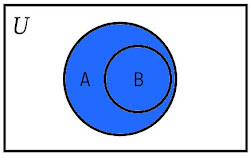Formula for the product of a sum by a difference of a binomial - (a-b)(a+b)=a^2-b^2
We continue with the next of the abbreviated multiplication formulas (a-b)(a+b)=a^2-b^2. Let's look at some problems to illustrate its applications.
Problem 1 Perform the multiplication (x+y)(x-y).
Solution: Now we apply the formula (a-b)(a+b)=a^2-b^2, where a=x and b=y, hence (x-y)(x+y)=x^2-y^2.
Problem 2 Perform the multiplication (3x-4y)(3x+4y).
Solution: Apply the formula (a-b)(a+b)=a^2-b^2, where a=3x and b=4y, hence (3x-4y)(3x+4y)=(3x)^2-(4y)^2=9x^2-16y^2.
3 Problem Perform the multiplication (x^2-z)(x^2+z).
Solution: Apply the formula (a-b)(a+b)=a^2-b^2, where a=x^2 and b=z, hence (x^2-z)(x^2+z)=(x^2)^2-(z)^2=x^4-z^2. Let us recall the power grading property, i.e. (a^n)^m=a^{n.m}.
4 Problem Calculate 17.23 in a rational way.
Solution: Represent the product 17.23 in the following way 17.23=(20-3)(20+3) and apply the formula (a-b)(a+b)=a^2-b^2, so 17.23=(20-3)(20+3)=20^2-3^2=400-9=391.
5 Problem Simplify the expression (3x-1)(3x+1)-(x-2)(x+2).
Solution: Thus we get that (3x-1)(3x+1)-(x-2)(x+2)=(3x)^2-1^2-(x^2-4)=9x^2-1-x^2+4=8x^2+3.
6 Problem Simplify the expression (x+2)^2-(x+1)(x-1).
Solution: Apply the formulas (a+b)^2=a^2+2ab+b^2 and (a-b)(a+b)=a^2-b^2, hence
(x+2)^2-(x+1)(x-1)=x^2+2.x.2+2^2-(x^2-1^2)=x^2+4x+4-x^2+1=4x+5.
7 Problem Prove the identity (a+b)(a-b)+(b+c)(b-c)+(c+a)(c-a)=0.
Solution:
Let's denote the left side of the equality by A and the right side by B.
A=(a+b)(a-b)+(b+c)(b-c)+(c+a)(c-a)=a^2-b^2+b^2-c^2+c^2-a^2=0. We have proved that A=B, hence the equality is an identity.
8 Problem Perform the multiplication (x+y+z)(x+y-z).
Solution: We will write the given product in the following way [(x+y)+z][(x+y)-z], now we will apply the formula (a-b)(a+b)=a^2-b^2, where a=x+y and b=z, hence we get that [(x+y)+z][(x+y)-z]=(x+y)^2-z^2=x^2+2xy+y^2-z^2.
9 Problem Simplify the expression (a+b)(b-a)+a(a-4c) and find its numerical value at a=2, b=-5 and c=3.
Solution:
(a+b)(b-a)+a(a-4c)=b^2-a^2+a^2-4ac=b^2-4ac. Now substitute in the resulting expression with a=2, b=-5 and c=3. Thus we get that the numerical value of the expression is (-5)^2-4.2.3=25-24=1.
10 Problem Find the numerical value of the expression (2x-3)^2-(x-2)(x+2)-(x-1)(3x-2) if x=\frac{1}{3}.
Solution: Apply the shortcut multiplication formulas (a-b)^2=a^2-2ab+b^2 and (a-b)(a+b)=a^2-b^2, and the product (x-1)(3x-2), multiplied by the "each by each" rule, we get that (2x-3)^2-(x-2)(x+2)-(x-1)(3x-2)=4x^2-12x+9-(x^2-4)-(3x^2-2x-3x+2). Now we reveal the parentheses and perform the apparitions 4x^2-12x+9-(x^2-4)-(3x^2-2x-3x+2)=4x^2-12x+9-x^2+4-3x^2+2x+3x-2=-7x+11. Now substitute in the now simplified expression x with \frac{1}{3}, where for the numerical value of the expression we get -7.\frac{1}{3}+11=-\frac{7}{3}+11=\frac{-7+33}{3}=\frac{26}{3}.
Homework assignments
1. Perform the grading:
a) (1-4x)(1+4x); b) (-5+a)(-5-a); c) (3x^2-4y^2)(3x^2+4y^2); d) (\frac{1}{3}x-y)(\frac{1}{3}x+y); e) $(a-b-c)(a-b+c).
2. Calculate the product by applying the sum by difference formula to two numbers:
a) 98.102; b) 47.53; c) 11.5.10.5.
3. Compare the values of the expressions 40^2 and 38.42.
4. Simplify the expressions:
a) (x-8)(x+8)-(x-8)^2; b) (a-5)(5+a)-(1-a)^2; c) (x+y)(x-y)+(x+y)^2-2xy.
5. Find the normal form of the expression:
a) (y-2)(y+2)(y^2+4); b) (\frac{a}{7}-\frac{6x}{5})(\frac{a}{7}+\frac{6x}{5}).
6. Calculate the value of the expression by simplifying it beforehand:
a) (2x+\frac{1}{3})(2x-\frac{1}{3})-x(4x-3), with x=1;
b) 5x^2-(3+2x)(2x-3), at x=0.3;
c) 10y^2-(2+3y)(3y-2), at y=0.2.
7. Prove the identity (x+y)(x-y)(x^2+y^2)(x^4+y^4)=x^8-y^8.
8. Prove the identity (9a-4)(a+1)+(3a-2)(-2-3a)=5a.
9. Find the numerical value of the expression A=(x-3)(x-2)(x+3)-(x+2)(x^2-9)-36 if x=3-|-2|.
10. A student randomly chooses one of the expressions a^2-b^2, (a+b)^2, (c-d)^2, b^2-a^2, a^2+b^2, (a-b)(a+b), 3a-3b. What is the chance of choosing an expression that is the difference of the squares of two numbers?
11. Find the values of the expression Q=q(q-1)+(2+q)(2-q) for all q for which q^{1;2;3;4;5}.
12. Find the normal polynomial identical to the expression:
a) (a-b)^2-2(a-b)(a+b)+(a+b)^2;
b) (x^2+2)^2-(x-2)(x+2)(x^2+4);
c) 5(a-2)(a+2)-\frac{1}{2}(8a-6)^2+38;
d) (a-1)(a^2+1)(a-1)-(a^2-1)^2;
e) 2(m-n)^2-2(m+n)^2-4(m+n)(m-n)+8mn;
f) (2a-1)(2a+1)-[\frac{1}{2}(4a-3)]^2+(2a-13)(a-\frac{1}{4}).
13. Is it true that for every x, the expression C=(5-x)^2-(x-3)(x+3)+5(2x-5) yields C>0?



Коментари
Публикуване на коментар